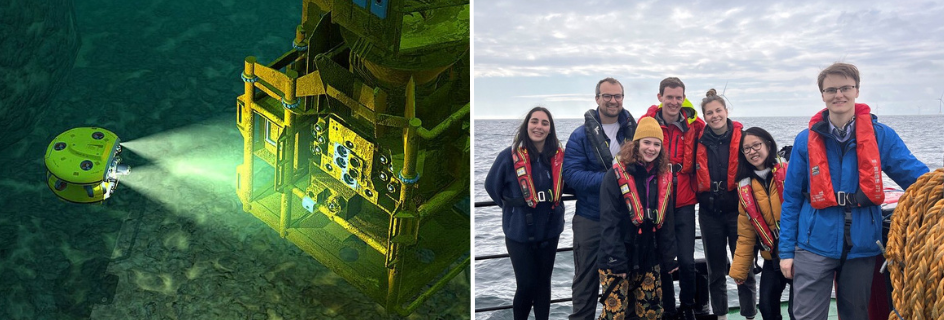Post date:
The School of Engineering is to lead two doctoral training centres (CDTs) to equip PhD students with key skills needed by the defence and security and renewable energy sectors.
The School will host the new EPSRC and MoD CDT in Sensing, Processing, and AI for Defence and Security (SPADS) which receives more than £8m, and the renewed EPSRC Industrial CDT in Offshore Renewable Energy (IDCORE) which receives £6m from EPSRC and a further £3m in industrial funding.
Funding for the CDTs was unveiled as part of the UK’s biggest-ever investment in engineering and physical sciences doctoral skills, totalling more than £1 billion, announced by Science, Innovation and Technology Secretary Michelle Donelan today.
Centres for Doctoral Training (CDTs) allow students to gain practical skills and knowledge in new and emerging technologies, while working directly with industry on the critical projects of today and tomorrow. They are funded by the Engineering and Physical Sciences Research Council (EPSRC), the UK's main agency for funding research in engineering and the physical sciences.
Sensing, Processing, and AI for Defence and Security
Led by the School of Engineering’s Professor James Hopgood, the EPSRC and MoD CDT in Sensing, Processing, and AI for Defence and Security (SPADS) has been designed to meet the need for artificial intelligence and data-driven solutions to national security challenges.
The CDT aims to train nearly 80 students over five years through a programme spanning sensing, processing and communications, with applications across software, algorithms and hardware.
The programme will focus on supplying the UK’s growing need for AI-driven generation-after-next technologies for intelligence, surveillance and reconnaissance (ISR) operations, which has been identified by the Ministry of Defence as a national security priority.
The CDT will equip students to develop technologies which operate more efficiently, accurately and with a lower size and weight footprint than ever before – enabling the UK’s defence sector to maintain its competitive edge on the world stage.
Students will study for a doctorate in engineering over four years while working on industrial projects such as developing distributed sensor network solutions for environments where GPS technologies do not work effectively; multi-model sensing to aid the inspection of underwater structures and objects; and improved data-driven technologies for search and rescue operations.
SPADS is delivered in partnership with Heriot-Watt University, and the University of Edinburgh’s schools of Informatics and Maths – enabling students on the programme to benefit from the longstanding expertise and cutting-edge research facilities based across the Edinburgh-based universities. This latest funding announcement follows a recent EPSRC investment of £24m to establish two new AI research hubs at Edinburgh’s School of Engineering focusing on electronics and healthcare.
Professor Hopgood said:
“I am delighted we are launching this exciting new research programme, built both on the University’s strong industrial partnerships and unique capabilities in signal processing research, hardware-enabled artificial intelligence and sensing, autonomous systems and mathematics. This expertise is extremely useful for defence companies focussing on intelligence, surveillance and reconnaissance, particularly situational awareness for the armed forces.
“It is a unique opportunity for students who want to pursue a PhD research programme, while benefitting from integrated studies co-designed and co-delivered with our industrial partners. By working together, we can train the engineers of the future and meet industry challenges.”
Offshore Renewable Energy
IDCORE is led by the University of Edinburgh, with the universities of Exeter, Swansea and Strathclyde and works with offshore renewable energy (ORE) companies to cement offshore renewables’ place in the UK economy and contribute to net zero strategy. It has been funded by EPSRC for a further five intakes of students.
Students will help companies such as Orbital Marine and SSE to improve efficiencies by, for example, studying the impact of turbulence on generators for tidal turbines; figuring out how to use oil and gas infrastructure for hydrogen or finding the right vessels for maintenance of offshore energy installations.
Academic Director Professor David Ingram, of Edinburgh’s School of Engineering, said: “All students on the engineering doctorate spend three years doing project-based research in a company, driven by the curiosity of the sponsoring company, finding solutions to a problem.
“The level of impact has been remarkable – one student designed a cable routing optimisation tool that saved EDF £10 million.
“In another example, engineering models of turbulence often focus on wind farms, but one student proposed alternative models for tidal energy that have influenced the design of next generation tidal installations. If you can be certain about load bearing, you don’t need to over-design and you can reduce the costs of bearings, for example. Providing certainty is worth a huge amount of money to companies.”
IDCORE began in Edinburgh in 2011 and is now on its third generation, having placed 107 students in 57 companies. Around half of those students go on to employment with that company, 80 per cent within the sector, and 100 % are employed.



